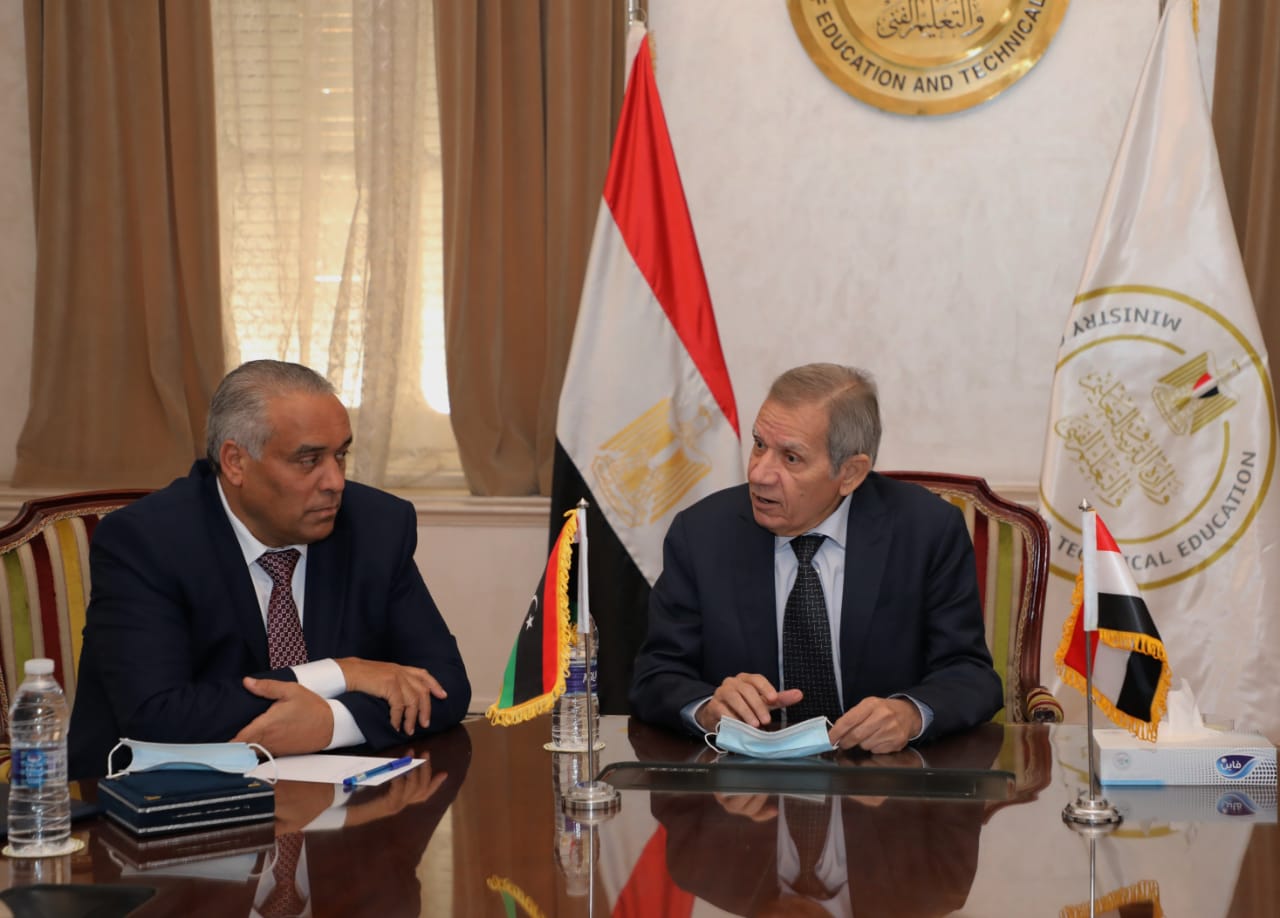"Education" meets with the Libyan delegation to discuss ways of cooperation in the field of technical education between the two countries

Dr. Muhammad Mujahid, Deputy Minister of Education for Technical Education, met today with Dr. Al-Ferjani Ali Ahmed, Undersecretary of the Ministry of Technical and Technical Education for Diwan and Development Affairs, and his accompanying delegation, to discuss ways of cooperation and transfer of expertise in the field of technical education between the two countries.
The meeting was attended by Dr. Mohamed Emara, Head of the Technical Education Sector, and Dr. Ahmed Ashmawi, Technical Education Consultant, and the Libyan delegation included Salah El-Din Salama Al-Sayeh, Director of the Department of Intermediate Technical Institutes, Dr. Abul-Qasim Kurban, Advisor to the Ministry of Foreign Affairs and International Cooperation, and Al-Sharif Mhamed Heili, Minister Plenipotentiary at the Ministry of Foreign Affairs and International Cooperation, and Nasr El-Din Younis Al-Awami, Director of the Technical, Technical and Private Education Department.
At the beginning of the meeting, Dr. Muhammad Mujahid welcomed the attendees, stressing the depth of the historical brotherly relations between the State of Libya and the Arab Republic of Egypt, and the strength and durability they witness at all levels, noting the importance of joint cooperation between the two countries, especially in the field of technical education.
Dr. Mohamed Megahed reviewed the stages of developing technical education in Egypt, stressing that attention has been paid to developing technical education since 2014 by developing a strategy based on four main axes to be relied upon in developing the technical education system, including the application of the competency methodology system that is based on skills and behaviors, Approximately 75% of technical education curricula have been changed to competency curricula.
He added that the Quality Assurance and Accreditation Authority for Technical Education was introduced, and the skills of teachers were improved by providing practical training based on developing learning methods, in addition to the participation of business owners in developing technical education through partnerships with the Ministry.
Mujahid indicated that the Ministry has established the Applied Technology Schools project, which are considered model schools for technical education, working to implement international standards in teaching and training methods, and are based on the partnership between the Ministry of Education and Technical Education and private or public sector companies in order to upgrade and advance the technical education system In Egypt, he pointed out that so far 28 applied technology schools have been implemented, and it is targeted to reach 100 applied technology schools by 2030.
For his part, Al-Ferjani Ali Ahmed, Undersecretary of the Ministry of Technical and Technical Education for Diwan and Development Affairs in Libya, stressed the importance of continuing and strengthening the frameworks of cooperation and joint coordination between the two brotherly countries, especially in the field of technical and technical education, praising the efforts made by Egypt in developing education, and expressing his aspiration for cooperation between the two countries in the field of education.
The meeting discussed cooperation and coordination in developing educational programs, especially new and renewable energies and related technologies. The Libyan side also expressed its desire to transfer the Egyptian experience and expertise in the field of technical and technical education and benefit from the Egyptian curricula in this regard.
It was also agreed that the two parties would exchange experiences regarding the establishment of Egyptian-Libyan technical schools and discuss the possibility of adopting unified certificates in the field of technical education, as well as establishing applied technology schools and sending Egyptian teachers and trainers to the State of Libya.
The Libyan side demanded the possibility of the Egyptian side participating in training Libyan technical education teachers and trainers to provide them with skills and experience and build a training system, in addition to exchanging a number of higher scholarships in the field of technical education to be agreed upon through diplomatic channels.
The two sides also discussed the work of the draft memorandum of understanding for joint cooperation in the field of technical and technical education between the State of Libya and the Arab Republic of Egypt, and agreed on a date for signing through diplomatic channels in the two countries.
More about education
